Substance Abuse Counseling
Scroll Down for Page Content
CONTACT DETAILS
Admissions Office
Admissions@BristolCC.edu
774.357.2947
777 Elsbree Street
Fall River, MA 02720
UPCOMING EVENTS
Bristol's Substance Abuse Counseling certificate program is designed to help students gain an in-depth understanding of addiction and substance use disorders.
Our graduates work with those struggling with addiction, eating disorders, or other behavioral issues, from the beginning of a patient's rehabilitation and throughout their recovery.
Why Substance Abuse Counseling at Bristol?
Students learn about the introduction of addiction, different counseling models, theories, and evidence-based practices in treating substance abuse issues. Students hone skills in Practicums I and II and earn hands-on experience at internship placement sites.
Upon completion of the Substance Abuse Counseling program, students are able to:
- Identify sign and symptoms of a substance abuse and addiction.
- Understand the criteria for a substance use disorder.
- Recognize the impacts of drug use on the individual, the family and society as a whole.
- Offer supportive services to families and friends of those struggling with addiction.
- Understand the processes of seeking/entering treatment services for substance use disorder.
- Understand treatment plans, medication assisted treatments and the recovery process.
- Understand outpatient, residential and community services.
- Understand the importance of community networking with collateral contacts and collaboration with local resources and outpatient services.
After completion of the Substance Abuse Counseling program, students will earn a certificate of achievement from Bristol and meet the educational and practicum hours necessary to take the Massachusetts exam for licensure and/or certification.
As a licensed or certified counselor, you will have opportunities to work in the substance abuse field as an individual or family counselor, case manager, or sober coach. The Licensed/Certified Alcohol and Drug Counselor (LADC/CADC) credentials are accepted in Massachusetts and other states.
These credentials are ideal for working professionals, and students currently enrolled in Behavioral and Social Sciences, Health Sciences, Human Services, Direct Support and Medical Assisting programs.
Bristol provides you the opportunity to apply the 29 credits earned towards a Human Services associate degree. Credits are also transferable to four-year institutions. Read more about transfer opportunities at Bristol here.
Graduates are ready to work in a field with much greater than average job growth. Due to the fentanyl epidemic and opioid crisis, there is high demand nationally for substance abuse counselors and substance abuse treatment services. That demand is greater on a local level. Fall River has the third highest addiction rate in the state of Massachusetts. New Bedford is the number one metropolitan area in the United States for substance abuse counselors, with the highest concentration of jobs and location quotients. The demand for qualified counselors has far outpaced the supply.
Take the Next Step
Apply to Bristol Community College today and begin your journey helping others as a substance abuse counselor. For program information, please contact Tim Hernandez at Tim.Hernandez@BristolCC.edu, and follow the link below for full program details in our college catalog.
